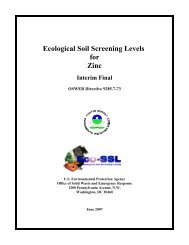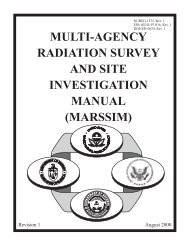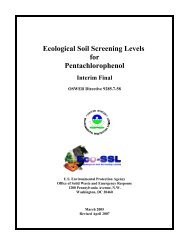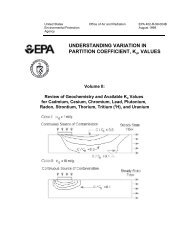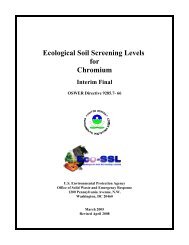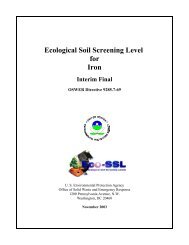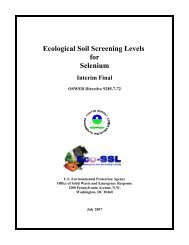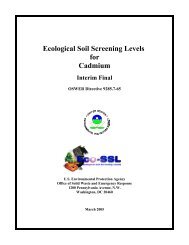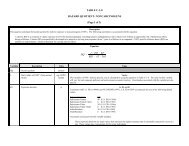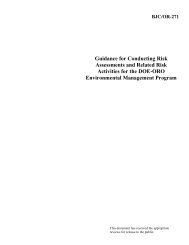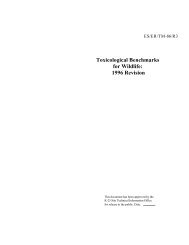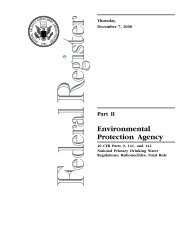Nickel - The Risk Assessment Information System
Nickel - The Risk Assessment Information System
Nickel - The Risk Assessment Information System
You also want an ePaper? Increase the reach of your titles
YUMPU automatically turns print PDFs into web optimized ePapers that Google loves.
5.2 Estimation of Dose and Calculation of the Eco-SSL<br />
Two separate Eco-SSL values were calculated for avian wildlife, one for each of two surrogate<br />
receptor species representing different trophic levels. <strong>The</strong> avian Eco-SSLs were calculated<br />
according to the Eco-SSL guidance (U.S. EPA, 2003) and are summarized in Table 5.2. An Eco-<br />
SSL value could not be calculated for the avian ground insectivore (woodcock) as a reliable<br />
method to estimate uptake of nickel from soil into soil invertebrates could not be identified (see<br />
Attachment 4-1 of the Eco-SSL guidance; U.S. EPA, 2003).<br />
Surrogate Receptor<br />
Group<br />
Avian herbivore<br />
(dove)<br />
Avian ground<br />
insectivore<br />
(woodcock)<br />
Avian carnivore<br />
(hawk)<br />
TRV for<br />
<strong>Nickel</strong><br />
(mg dw/kg<br />
bw/d) 1<br />
Table 5.2 Calculation of the Avian Eco-SSLs for <strong>Nickel</strong><br />
Food Ingestion<br />
Rate (FIR) 2<br />
(kg dw/kg bw/d)<br />
Soil Ingestion<br />
as Proportion<br />
of Diet (P s) 2<br />
6.71 0.190 0.139<br />
Concentration of<br />
<strong>Nickel</strong> in Biota Type<br />
(i) 2,3<br />
(B i)<br />
(mg/kg dw)<br />
ln(B i) = 0.748 *<br />
ln(Soil j) -2.223<br />
where i = plants<br />
Eco-SSL<br />
(mg/kg dw) 4<br />
6.71 0.214 0.164 NA NA<br />
6.71 0.0353 0.057<br />
ln(B i) = 0.4658 *<br />
ln(Soil j) - 0.2462<br />
where i = mammals<br />
1<br />
<strong>The</strong> process for derivation of wildlife TRVs is described in Attachment 4-5 of U.S. EPA (2003).<br />
2 Parameters (FIR, Ps, Bi values, regressions) are provided in U.S. EPA (2003) Attachment 4-1 (revised February 2005).<br />
3<br />
Bi = Concentration in biota type (i) which represents 100% of the diet for the respective receptor.<br />
4<br />
HQ = [FIR * (Soilj * Ps + Bi)] / TRV solved for HQ=1 where Soilj = Eco-SSL (Equation 4-2; U.S. EPA, 2003).<br />
NA = Not Available.<br />
6.0 ECO-SSL FOR MAMMALIAN WILDLIFE<br />
<strong>The</strong> derivation of the Eco-SSL for mammalian wildlife was completed as two parts. First, the<br />
TRV was derived according to the Eco-SSL guidance (U.S. EPA, 2003; Attachment 4-5).<br />
Second, the Eco-SSL (soil concentration) was back-calculated for each surrogate receptor species<br />
based on the wildlife exposure model and the TRV (U.S. EPA, 2003).<br />
6.1 Mammalian TRV<br />
<strong>The</strong> literature search was completed according to the Eco-SSL guidance (U.S. EPA, 2003;<br />
Attachment 4-2) and identified 1,169 papers with possible toxicity data for nickel for either avian<br />
or mammalian species. Of these studies, 1,101 were rejected for use as described in Section 7.5.<br />
Of the remaining papers, 52 contained data for mammalian test species. <strong>The</strong>se papers were<br />
reviewed and the data were extracted and scored according to the Eco-SSL guidance (U.S. EPA,<br />
2003; Attachment 4-3 and 4-4). <strong>The</strong> results of the data extraction and review are summarized in<br />
Table 6.1. <strong>The</strong> complete results are provided as Appendix 6-1.<br />
Eco-SSL for <strong>Nickel</strong> 10<br />
March 2007<br />
210<br />
2800



